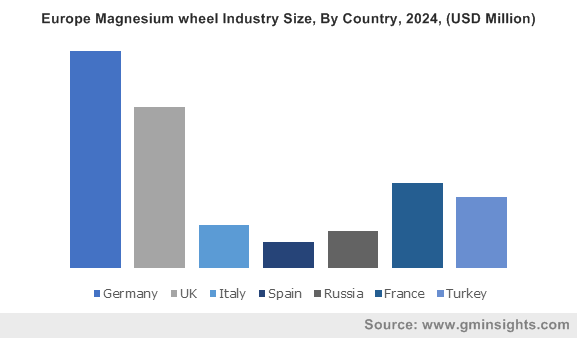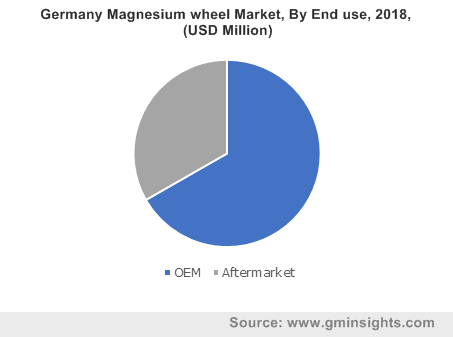Home > Automotive > Automotive Parts > Tires and Wheels > Magnesium Wheel Market
Magnesium Wheel Market Analysis
- Report ID: GMI2129
- Published Date: Apr 2019
- Report Format: PDF
Magnesium Wheel Market Analysis
The lower production costs associated with cast products are boosting the segment share over the projected timeframe. Lower complexities in casting coupled with easier fabrication processes will further support the process adoption. The uniform grain structure along with the availability of multiple manufacturing processes including low pressure and gravity casting will prominently impact the magnesium wheel market share.
The increasing adoption of forged automotive components can be attributed to multiple benefits offered including higher tensile strength, lower weight, and ability to handle heavier loads compared to cast products. The cross-linked internal structure of the forged wheels makes these wheels tough, thereby contributing toward its diversified applications across the automotive sector. Additionally, these wheels are also ideal for high-speed automotive applications including racing, thereby accelerating the market size over the study timeframe.
OEMs will account for a significant share owing to the increasing preference of automobile manufacturers to incorporate high-end features in their vehicles for improving their aspirational value. Additionally, magnesium wheels contribute considerably toward improving vehicle efficiency and reducing emissions owing to their lower weight. Further, improved ride quality & comfort on uneven roads and superior damping capabilities are some of the major factors supporting the magnesium wheel market growth over the study timeframe.
Aftermarket will grow significantly in the market. This can be attributed to the rising preference of consumers to customize their vehicles in the aftermarket. The requirement for replacing wheels after a certain driving range along with tires repair & replacement owing to defects and accidents will further expand the segment size. Additionally, the wearing of tires on old vehicles along with the ability of these tires to improve vehicle comfort will significantly accentuate the magnesium wheel market expansion.
Increasing adoption of two wheelers owing to rising traffic congestion and easier manoeuvrability across cities & towns are expanding the bikes growth over the projected timeframe. The lower wheel weight enables for easier riding and improves bike efficiency significantly. Automobile OEMs are launching upgraded products with magnesium wheels for expanding their market share. For instance, in 2019, Aprilia unveiled its RSV4 X bike with factory-fitted magnesium wheels.
Premium and sports cars accounted for a significant volume share over the study timeframe. This can be attributed to the increasing demand for such cars with technologically-advanced features. The improving performance including quick acceleration and braking along with superior heat dissipation while traveling over long distance further supports the segment growth. Additionally, these wheels offer significantly superior ride quality compared to other wheels, thereby playing a major role in increasing the wheel adoption for premium and sports cars.

Europe accounted for a significant revenue share in the magnesium wheel market size. This can be attributed to the presence of major automobile manufacturers across the region focusing on launching newer vehicles and upgrading their existing product portfolio. Few of the major automobile OEMs in the region include Volkswagen, BMW, Skoda, Audi, and Rolls Royce are introducing vehicles with magnesium wheels to improve their market share. For instance, in 2018, Porsche launched its upgraded GT2 RS model with magnesium wheels offering significant weight savings of around 11 kg.
The increasing vehicle sales in Asia Pacific owing to improving disposable income and rising preference for personal mobility are driving the market across the region. Rising sales of premium and luxury vehicles along with proliferating automotive aftermarket industry will further accentuate the regional share. Moreover, stringent regulatory policies are enabling industry players to invest in lightweight and efficient automotive components for improving vehicle efficiency and lower carbon emissions, thereby contributing significantly toward the product adoption.

